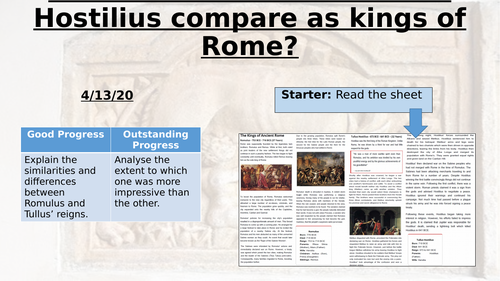

I have created this lesson due to the lack of resources available to secondary teachers above and beyond the standard trope of "Romulus was celebrated because he founded Rome and established the city among its neighbours’ and Tullus Hostilius was a bad king because he focused far too much on war and neglected religion’ This view is expounded by nearly all freely available information on the Roman kings online and in secondary text books.
This has arguably come about because Livy is the ‘go-to’ source for a history of the Roman regal period. This is fine but often other resources take his moral stances and opinions as fact. It is well known in academia (as the lesson points out using scholarship in an accessible way) that Livy uses the first four Roman kings as a vehicle for his messages regarding proper decorum from Rome’s public officials. He claims there are lessons to be learnt from History and shapes his narrative to do this.
This lesson therefore seeks to dig into the similarities between Romulus and Tullus, both war-like and easily compared, and to challenge the notion that Tullus’ kingship should be seen in the negative light in which school-level resources tend to (all too easily) paint him. It introduces the opinions of Dionysius of Halicarnassus and of Cicero in order to draw out the nuance in the ways Romans themselves interpreted Tullus’ reign in light of Romulus’ achievements.
There is suitable challenge in this lesson as you might imagine but I have also been careful to provide plenty of support in the way of glossaries of key terms and key questions teachers should be posing at each point within the lesson.
Something went wrong, please try again later.
This resource hasn't been reviewed yet
To ensure quality for our reviews, only customers who have purchased this resource can review it
Report this resourceto let us know if it violates our terms and conditions.
Our customer service team will review your report and will be in touch.